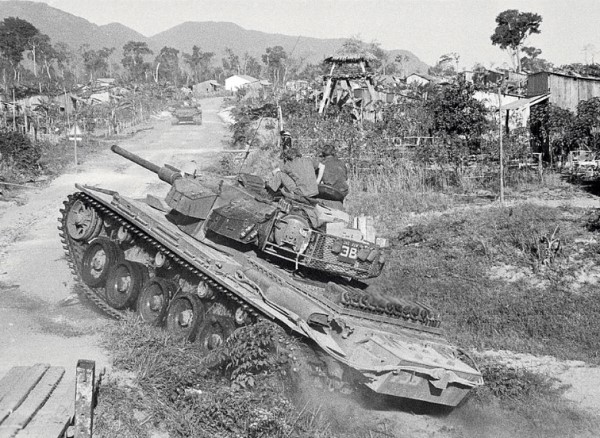
A miscommunication over paperwork for the 2004 visit meant he was held up at gunpoint by officials and thrown in jail.
"When I came back to Australia, I had 14 days of nightmares," McKay tells AAP.
"My bed would be soaked with sweat, I'd be yelling and carrying on. I'd have the most terrible nightmares - not to do with what happened to me, but I would be killing people with knives. It was just awful."
McKay tried self-medicating "with beer and rum", but when that wasn't working he sought help from the Vietnam Veterans Counselling Service, now known as Open Arms.
"They taught me how to deal with flashbacks. It wasn't easy, but we got there," he says.
Today marks the 60-year anniversary of Australia's involvement in the Vietnam War with the arrival of Colonel F.P. Serong to lead a contingent of advisors.
An Australian battalion joined the war in 1965 and a task force was deployed the following year after the introduction of conscription.
The war would become the century's longest-running conflict in which Australian forces participated.
McKay was a 15-year-old high school student in his native Perth at the time of Serong's deployment with "more important things to worry about, like footy and surfing".
"I didn't even know which side of the equator Vietnam was on," he says.
But a few years later, while working as a trainee computer programmer in Sydney, McKay was conscripted, fast-tracked through officer training and put on a boat to Vietnam to lead a platoon of 35 men. He wasn't even 21.
"It was the first time I had ever been in a Chinook (helicopter). As soon as you got in that chopper and started flying off you realised you were in a war zone, because everything was littered with bomb craters ... everywhere you looked there were people with weapons," he says.
"It was confronting, we were in the deep end."
He would lead daily 10km patrols with each of his men carrying between 25 and 30kg of supplies with one objective, "To find the enemy and kill him."
"Stealth was the operative word - you had to be quiet. We wore facial camouflage, sleeves down, we didn't have camouflage uniforms in those days - they were green, but they'd go dark because of the sweat."
McKay was awarded the Military Cross for his involvement in the Battle of Nui Le, during which he was shot twice, shattering his left shoulder.
"I spent about a year in hospital - which is why I always get pissed off when I watch cops and robbers movies and someone gets a .45 in the shoulder and the next day they just have their arm in a sling," he says with a wry laugh.
From 1962 to 1973, about 60,000 Australians served in defence of South Vietnam. More than 3000 were wounded and 521 killed during the conflict.
It may be nearly 50 years since the war ended, but in some ways the survivors never really left, McKay says.
"We send people into an abnormal environment where they're trying to kill each other, and then when they come back they expect them to just assimilate into society. That just doesn't happen," he says.
"In close-quarter combat you see and hear and smell things you really don't want to, and those images are etched in your brain permanently."
When the soldiers did return, those who had been conscripted were given discharge papers and sent home without so much as a debrief, he says. And their homecoming wasn't always welcome.
The sentiment towards returning servicemen could be "nasty" because of people's opposition to Australia's involvement in the war, he says. Soldiers were easier targets than politicians.
A decade after he returned from Vietnam, McKay and his sergeant met at a funeral and discussed the fact that some of their platoon were not doing so well.
They organised a reunion, which has now been happening regularly for 30 years.
"It has proved worthwhile. We get together, tell lies, drink a reasonable amount of beer," he laughs.
"We have a great time and it allows them to be in contact with each other and help each other. Six of the platoon have died and we go to the funerals and support each other. If someone's having a hard time we reach out."
McKay, who went on to become a colonel and also learned Vietnamese, visits the formerly war-torn country regularly.
He leads tour groups with Mat McLachlan Battlefield Tours and has written books about his life as a soldier and beyond.
He's even become friends with some of his former enemies. They play tennis together, have a few beers and celebrate the fact they're still alive.
"There's no anger. We were just blokes doing their job. The shame of it was, we shouldn't have been there," says McKay.
© AAP 2022
Image: Manhai/Flickr